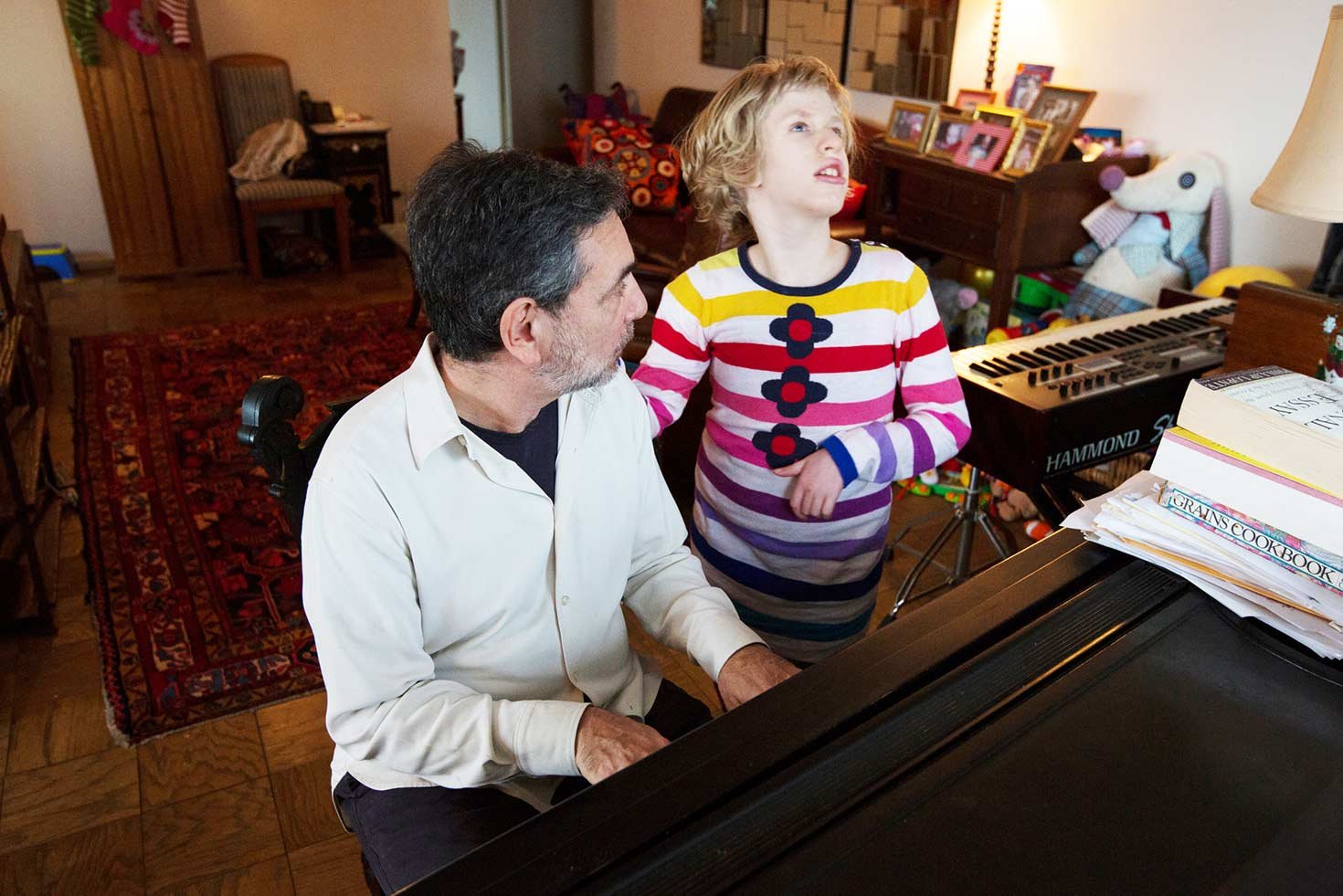
In July, a month after the Gay Pride March is scheduled to unfold, a different kind of pride procession is set to commence: the Disability Pride NYC parade.
The impetus behind the inaugural march, which organizers call the first of its kind in New York City, might seem unlikely: the jazz pianist Mike LeDonne.
Mr. LeDonne, a fixture on the city’s jazz scene for decades, said he has been working for several years to create an annual Disability Pride Day and parade to shine a spotlight on people with mental and physical disabilities.
“Actually, she’s the reason for the parade,” said Mr. LeDonne, 58, pointing to his daughter, Mary, 10, inside their apartment in Hell’s Kitchen. She was on the floor, cradling a musical toy, and repeatedly pressing its buttons to hear a variety of tinny melodies.
Mary was born with Prader-Willi syndrome, a genetic disorder that has left her developmentally disabled and without speech. She is legally blind and often uses a wheelchair.
She is also highly sensitive to music and has an insatiable appetite for it, which has helped her learn, develop and interact with the world, said Mr. LeDonne. He was moved by his daughter to create a lively public musical procession that celebrates people whose distinctiveness is usually described in negative terms.
Mr. LeDonne said he enlisted as much volunteer help as he could to organize the parade, which is scheduled for July 12 and will proceed from Madison Square to Union Square. He has created a nonprofit organization and is holding a fund-raiser on Thursday featuring prominent jazz musicians, including Ron Carter, Benny Golson and Brad Mehldau.
Mr. LeDonne is also performing, and plans to bring his daughter.
The event, Jazz Legends for Disability Pride, will take place at the Quaker Friends Meeting Hall near Gramercy Park. The musicians, Mr. LeDonne said, are his friends and colleagues and are donating their performances.
“I called in all my favors,” he said. “Actually, they said, ‘I’d be insulted if you didn’t ask me to do it.’ That’s the spirit of the jazz world.”
Mary has been exposed all her life to Mr. LeDonne’s practicing and composing at home, and to his extensive collection of recordings.
Mr. LeDonne’s wife, Margaret Patterson-LeDonne, works full time, leaving Mr. LeDonne to care for Mary when she is not in school at the Jewish Guild School For the Blind.
“I’m the daytime Mr. Mom guy,” said Mr. LeDonne, who plays Mary Liszt piano recordings each morning. She serves as his sounding board when he is trying out arrangement ideas.
“I turn around, and if she’s moving to the music, then I know I got something good,” he said.
Mr. LeDonne said that taking Mary out in public has led to staring and pointing, as well as remarks that are overly apologetic and drenched in sympathy.
“Often, people will say, ‘Oh, you have a disabled child, I’m sorry,’ ” he said. “I tell them, ‘Don’t be sorry. I love my child and she really is cool. She’s a miracle and a blessing.’ ”
Continue reading the main story
The goal of the pride day is to increase awareness and help “break the stereotypes and show people that these people are not to be pitied,” he said, adding that he hoped the parade offered a way for “the general public and the disabled to mix together on a day when they’re just having fun and being people.”
The parade idea came to him while listening to a choir of children at Mary’s school, he said. The children were joyously singing “Put On a Happy Face.”
Mr. LeDonne set up a Facebook page to gauge interest. It gained a following, “and it just grew from there,” he said.
The parade will likely follow Broadway, with vendors and informational kiosks along the route, and rallies at both ends that will include entertainment and speakers, said Mike Schweinsburg, a disability activist and board member with Mr. LeDonne’s group.
The Mayor’s Office for People with Disabilities has helped with street permits and other logistics for the parade, said the office’s commissioner, Victor Calise.
“We love the idea of the parade and we’re working to make it happen,” said Mr. Calise, a Queens native who was paralyzed following a mountain biking accident in 1994. “It’s a great opportunity,” he added, to remind “New York City residents and the world that people with disabilities are part of society, demand equal rights and most of all, celebrate who we are.”
As a tribute to Mary and her classmates, Mr. LeDonne recorded “Put On a Happy Face” on his 2014 release “I Love Music,” and began including it in his performances. As a composer, Mr. LeDonne has written music for Mary, including the five-part “Suite Mary” on “Speak,” a 2013 recording.
In his apartment recently, he sat at his Steinway baby grand piano and played the “Listen” segment of the suite, a tune he often plays to calm her. Then he played a lush rendition of the song “Love, I Found You,” with Mary rocking her head as Mr. LeDonne anchored the tune with an insistent pedal bass.
Mary’s musical taste as a listener is fairly mature. She favors the funk of James Brown and Sly and the Family Stone, and enjoys organ jams by Jimmy Smith and also Brother Jack McDuff. Among jazz guitarists, she favors Grant Green and Wes Montgomery.
“We hang out like two college kids, just rocking tunes real loud,” Mr. LeDonne said. Mary did not begin walking until age 5, and her first steps were taken to get to a piano, Mr. LeDonne said, as his daughter stood at the keyboard, playing separate, purposeful patterns with either hand.
She plays repeating patterns with odd combinations of notes, which she develops into themes, he said.
“She’ll do this for hours,” he said. “She finds sounds I never knew existed.”
